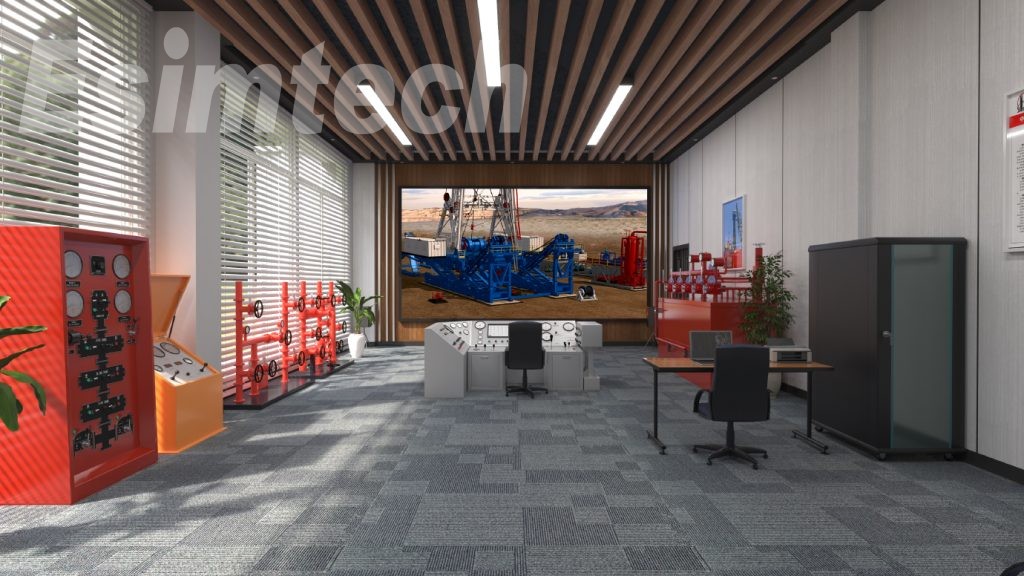A Comprehensive Guide to Vertical Drilling in Oil and Gas Exploration
Vertical drilling stands as the bedrock method for tapping into the vast reservoirs of hydrocarbons buried beneath the Earth's surface, marking a crucial stage in the quest for energy resources. Often referred to as "vertical well drilling," this technique involves piercing the Earth's crust vertically, providing access to lucrative oil and natural gas deposits. In this comprehensive overview, we'll delve into the principles, key techniques, applications, and the pivotal role of simulation technology in vertical drilling operations within the oil and gas sector.

Principles of Vertical Drilling
Direct Descent: As the name suggests, vertical drilling entails creating a wellbore that descends straight into the ground, perpendicular to the surface. This contrasts with directional drilling, where the trajectory may deviate to reach specific targets.
Drilling Rig: Central to vertical drilling is the drilling rig, a sophisticated piece of equipment engineered to bore through various subterranean materials. Equipped with a drilling bit, drill pipe, and essential tools, the drilling rig facilitates the drilling process with precision and efficiency.
Mud Circulation: Specialized drilling fluid, known as "mud," is crucial in vertical drilling. It serves multiple functions, including cooling and lubricating the drill bit, stabilizing the wellbore, and transporting cuttings to the surface for analysis.
Key Techniques in Vertical Drilling
Spudding: This initial step involves using a specialized spud bit to drill a shallow starting hole or "spud" at the surface, ensuring stability for subsequent drilling operations.
Rotary Drilling: The most common technique, rotary drilling employs a spinning drill bit attached to a drill pipe. As the bit cuts into the subsurface material, circulating drilling fluid ("drilling mud") transports cuttings to the surface, making it effective across various geological formations.

Percussion Drilling: Also known as cable tool drilling, this method involves repeatedly raising and dropping a heavy chisel-like bit to break rock formations. Although less prevalent, it finds application in drilling through hard rock.
Air Rotary Drilling: Compressed air is utilized to remove cuttings and cool the drill bit in this technique, particularly effective in unconsolidated or loosely consolidated formations like sands and gravels.
Coring: This method involves taking a cylindrical core sample from the subsurface, providing crucial geological information for mineral exploration, environmental assessment, and geotechnical studies.
Reverse Circulation Drilling, Auger Drilling, Diamond Drilling, Direct Push Drilling, and Geothermal Drilling: These techniques cater to specific drilling needs, from obtaining large-diameter core samples to minimal disturbance drilling in environmental and geotechnical applications.
Applications of Vertical Drilling in the Oil and Gas Industry
Exploration and Production: Vertical drilling serves as the primary method for accessing deep hydrocarbon sources, laying the groundwork for subsequent extraction operations.
Reservoir Characterization: Crucial in understanding oil and gas reserves, vertical drilling provides insights into the composition, porosity, and permeability of subsurface strata, aiding in reservoir assessment.
Workover Operations: Vertical drilling plays a role in maintaining, repairing, or enhancing existing wells, allowing access to different reservoir zones and stimulating production.
Secondary and Tertiary Recovery: Employed in enhanced oil recovery methods, vertical drilling facilitates the introduction of fluids into reservoirs to maximize hydrocarbon recovery.
The Significance of Simulation Technology in Vertical Drilling
Simulation technology replicates real-world drilling scenarios in a virtual environment, offering invaluable benefits:
Risk Mitigation: Detect potential obstacles and hazards associated with drilling operations, allowing engineers to devise mitigation techniques and reduce the likelihood of setbacks.
Optimized Drilling Parameters: Fine-tune drilling parameters to maximize penetration rates while minimizing equipment wear and tear, leading to cost savings and enhanced efficiency.
Training and Skill Development: Provide a safe environment for drillers and engineers to develop their skills and gain hands-on experience before operating real drilling rigs, improving safety and reducing the learning curve.
Wellbore Stability Analysis: Predict potential wellbore instability issues and design solutions to prevent them, ensuring safe and successful drilling operations.
Economic Feasibility: Assess the economic viability of drilling projects by modeling different scenarios, aiding in decision-making and resource allocation.

Conclusion
Vertical drilling remains a cornerstone technology in the oil and gas industry, enabling access to vital energy resources buried deep beneath the Earth's surface. The integration of simulation technology enhances drilling operations, making them more efficient, cost-effective, and environmentally responsible. As technology continues to evolve, the role of vertical drilling, coupled with simulation advancements, will remain indispensable in meeting global energy demands while ensuring sustainable resource utilization for generations to come.
- Art
- Causes
- Crafts
- Dance
- Drinks
- Film
- Fitness
- Food
- Oyunlar
- Gardening
- Health
- Home
- Literature
- Music
- Networking
- Other
- Party
- Religion
- Shopping
- Sports
- Theater
- Wellness


